#a man alone (1946)
Explore tagged Tumblr posts
Text


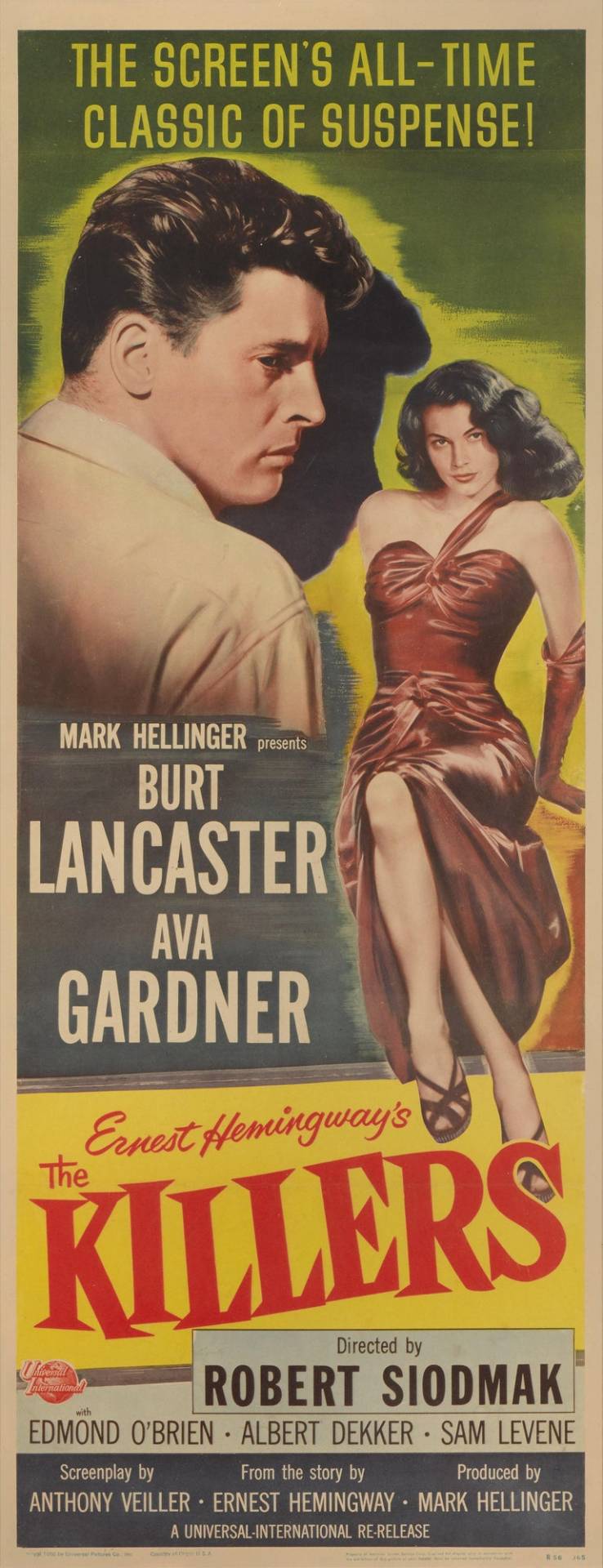


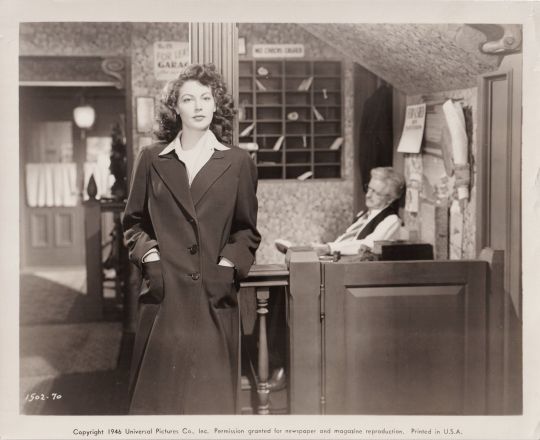
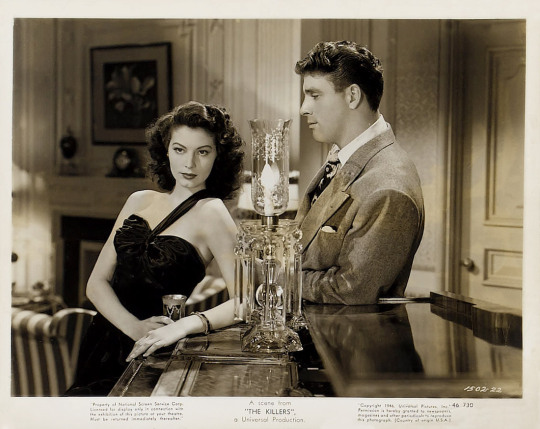
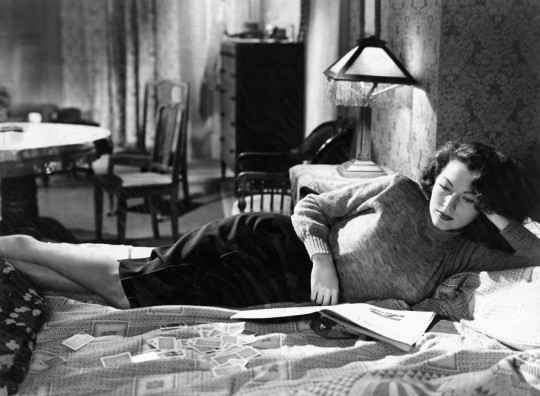
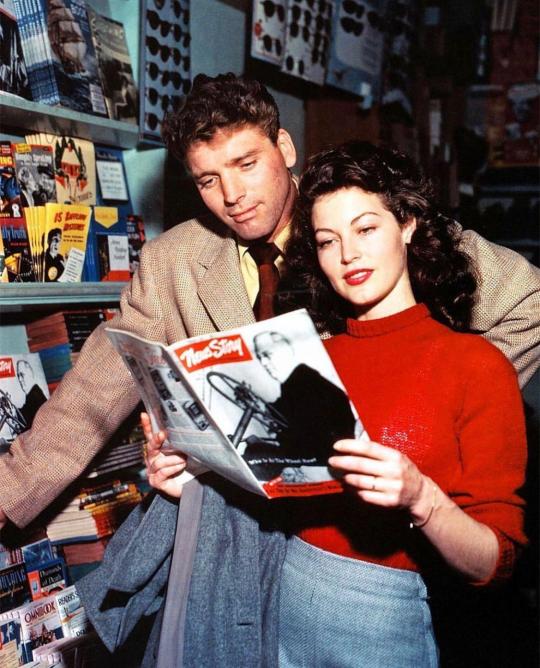
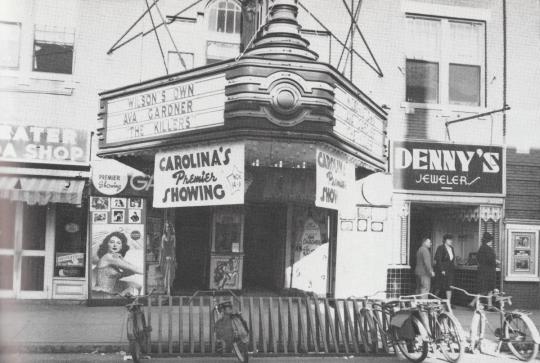
The Killers (1946) Robert Siodmak
December 7th 2023
#the killers#1946#robert siodmak#edmond o'brien#burt lancaster#ava gardner#sam levene#albert dekker#vince barnett#virginia christine#jack lambert#william conrad#donald macbride#ernest hemingway#a man alone (1946)#ernest hemingway's the killers#a man alone
21 notes
·
View notes
Text

This month, Olena Vladymyrets, a Holodomor witness from the Vinnytsia region,celebrated her 95th birthday. Ms Olena was born on November 4,1929. She is the only one of 3 daughters of Oleksandr and Marta Tsvylyk who survived the Holodomor. Photo from Nina Vladymyrets' Fb page. "We lived in Tomashpil village in the Khmilnytskyi district, Vinnytsia region.There were 3 of us: the eldest, Larysa, born in 1927; me, in 1929; the youngest, Mariyka, in 1932. Both of my sisters didn’t survive. Mariyka was only 5 months old," she told our museum staff in an interview. During the Holodomor, she was very young, but she heard from her parents that before collectivization, people lived decently. "Those who worked, they lived..." But then, all their bread was taken away. "You know, as they used to say: 'Lenin told Stalin to take away the 'surpluses' but Stalin thought: take everything to the last crumb!' And so they did. My mother managed to earn a small amount of grain and put it in a pot to cook. She placed the pot in the oven, covering it with cauldron of water as if she were only heating the water. Activists broke in, poured out the water, removed the small pot of grain, and dumped it into their bag. Neither tears nor pleas helped. They took everything from everyone, and that is how the famine began." In 1946-1947, Olena Oleksandrivna experienced yet another man-made famine. "Mother and five of us, children, (four were born after the Holodomor) were already without a father (he died in the war). In the winter of 1947, Mother travelled to Western Ukraine seven times to trade some household goods for food." Ms Olena recalls. "She took all the essential items we had at home, including linens, towels, and various other things. It was a hard journey; they travelled in boxcars,got caught,and were forced off. And I, at 16, stayed home alone with the children. When Mum returned from the West, she brought a bit of grain. We kept a little for ourselves,then took the rest to the market in Bykiv, 8–10 km away. There, Mum sold the grain and bought clothes—jackets, skirts, dresses, scarves to go back to the West, as we had already sold out everything we had. I looked at those clothes and wanted a dress or a skirt so badly; after all, I was a girl! But what could I say to my mother? There were still younger children at home who were asking for food…" Today, Ms Olena, along with all of Ukraine, is going through another hardship—the war unleashed by Russia. Despite her age, she helps her daughter Nina make trench candles for Ukrainian soldiers. In addition, throughout the summer, the women made homemade treats for the soldiers they grew themselves: pastila, adjika, pickled cucumbers, tomatoes, fruits, vegetables, and berries! Although our birthday celebrant needs a walker to move, she actively contributes to volunteer work. She rolls cardboard for candles, peels fruits and vegetables, and assists her daughter as much as she can. Her daughter has also sent five drones to the front lines and provided medications, tourniquets and other essential items requested by the soldiers. We wish Ms Olena health,a long life,and a speedy Victory,which she dreams of more than anything else! May her dream come true! —Holodomor Museum
158 notes
·
View notes
Text
specific movie scenes my brain likes to bring up to me now and then:
from "romeo + juliet" (1996) | juliet arrives at the church in a modest black dress with a white pilgrim's collar. she also wears a black beret and gloves with little bows at the wrist. meeting father laurence, she's in a desperate state and puts a compact pearl-grip pistol to her head. she laments and father laurence comes towards her. she levels the pistol at him instead and howls, "be not so long to speak. i long to die !"
from "a knight's tale" (2oo1) | jocelyn and william are arguing in a church and a priest comes to them to scold her, alone, for being too loud. she rounds on the man, saying, "do not shush me and spare him. now be gone ! go !" and he does go.
from "la belle et la bête" (1946) | the beast has just transformed into a prince, and noticing belle's disappointment, he asks, "but did you love the beast?" to which beguiling belle, lifting her chin, replies, "yes."
from "dangerous liasons" (1998) | the marquise de merteuil wailing and tearing apart her chambers. she throws a candelabra at the wall, sweeps everything off of her dressing table- breaking a mirror and toppling a pot of powder- and starts tearing at her own clothes as her maids arrive to see what's going on. the marquise screams at them all to get out before collapsing onto her knees. her wails continue.
from "valerie a týden divů/valerie and her week of wonders" (197o) | valerie is tied to a stake and a priest orders her to confess to the crime of being a witch. she devilishly lolls her tongue out at the priest and calls him a liar and a pyromaniac. asked once more to repent, valerie instead makes a silly little moustache out of her own hair, mocking the priest's looks, and calls him a "hairy-faced clown". the priest then sets her on fire.
97 notes
·
View notes
Text
The Dead Poets favorite Christmas movies (inspired by the cute post @everythingisawayoflife made of the Poets favorite films):
Knox Overstreet-
It’s a Wonderful Life (1946)- He especially would love the beginning, when Jimmy Stewart and Donna Reed are young and in love (“I’ll lasso the moon for you” is SO Knox coded, oh my stars)
Love Actually (2003)
Home Alone (1994)
A Charlie Brown Christmas (1965)
Charlie Dalton-
Jingle All the Way (1996)- you cannot tell me this man wouldn’t love Arnold Schwartzzenager as the every day family man trying to hunt down a turboman doll. He would be going around doing his best Arnie impression for days
Christmas Vacation (1989)
Die Hard (1988)
Gremlins (1984)
Neil Perry-
White Christmas (1954)- a Christmas musical? sign this man UP
Miracle on 34th Street (1947)
The Holdovers (2023)
Elf (2003)
Todd Anderson-
How the Grinch Stole Christmas (1966)
Edward Scissorhands (1990)
A Muppet Christmas Carol (1992)
Little Women (1994)
Gerard Pitts-
Scrooged (1988)
Batman Returns (1992)
Also Die Hard (1988)
Bad Santa (2003)
Steven Meeks-
A Christmas Story (1983)
Polar Express (2004)
Rudolph the Red-Nosed Reindeer (1964)
The Snowman (1982)
Richard Cameron-
Klaus (2019)
Meet Me in St. Louis (1944)
The Shop Around the Corner (1939)
Frosty the Snowman (1969)
#dead poets society#dps fandom#dps#neil perry#todd anderson#knox overstreet#charlie dalton#richard cameron#Steven Meeks#Meeks#Pitts#gerard pitts#headcanon#dps headcanons
41 notes
·
View notes
Text
57 Christmas Scripts to Read
The Curse of the Cat People (1944, Internet Archive)
It's a Wonderful Life (1946, Reddit)
The Apartment (1960, Script Slug)
Black Christmas (1974, Internet Archive)
The Star Wars Holiday Special (1978, Star Wars Holiday Special)
Trading Places (1983, The Script Lab)
A Christmas Story (1983, Daily Script)
Gremlins (1984, Horror Lair)
Silent Night, Deadly Night (1984, Reddit)
Lethal Weapon (1987, Script Slug)
Die Hard (1988, Script Slug)
Scrooged (1988, Screenplay Explorer)
National Lampoon's Christmas Vacation (1989, Daily Script)
Edward Scissorhands (1990, Daily Script)
Die Hard 2 (1990, Daily Script)
Home Alone (1990, Internet Archive)
Maniac Cop 2 (1990, Internet Archive)
Batman Returns (1992, Script Slug)
Home Alone 2: Lost in New York (1992, Internet Archive)
The Nightmare Before Christmas (1993, Screenplays and Scripts)
Little Women (1994, archived link)
The Ref (1994, Internet Archive)
The Santa Clause (1994, Script Slug)
While You Were Sleeping (1995, Script Slug)
Jingle All the Way (1996, Script Slug)
The Long Kiss Goodnight (1996, Internet Archive)
The Preacher's Wife (1996; via Kyle Alex Brett)
How the Grinch Stole Christmas (2000, Internet Archive)
Bad Santa (2003, Script Slug)
Elf (2003, archived link)
Love, Actually (2003, Daily Script)
The Polar Express (2004, Reddit)
The Family Stone (2005, Internet Archive)
Kiss Kiss Bang Bang (2005, Daily Script)
Black Christmas (2006, Internet Archive)
The Holiday (2006, Script Slug)
Last Holiday (2006, Script Slug)
Fred Claus (2007, Script Slug)
P2 (2007, Internet Archive)
Wind Chill (2007, Daily Script)
Four Christmases (2008, archived link)
Arthur Christmas (2011, Internet Archive)
Carol (2015, TWC Guilds)
Krampus (2015, Internet Archive)
Tangerine (2015, via IndieWire)
A Bad Mom's Christmas (2017, The Script Lab)
Better Watch Out (2016, Internet Archive)
Hallmark: Christmas in Evergreen (2017, Rick Garman)
The Man Who Invented Christmas (2017, Script Slug)
Hallmark: Christmas at Pemberley Manor (2018, Rick Garman)
Hallmark: A Blue Ridge Mountain Christmas (2019, Rick Garman)
Little Women (2019, Variety)
The Lodge (2019, Internet Archive)
Happiest Season (2020, Internet Archive)
8-Bit Christmas (2021, Script Slug)
The Holdovers (2023, Deadline)
Red One (2024, Amazon MGM Studios Guilds)
22 notes
·
View notes
Text
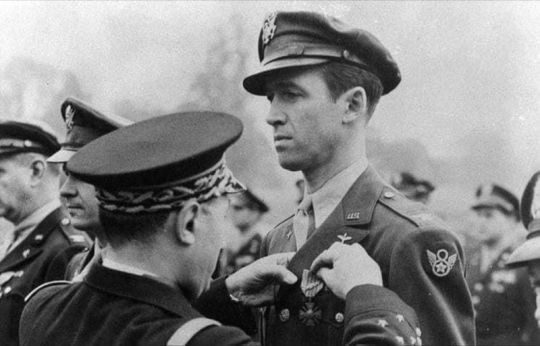
Jimmy Stewart & Post-Traumatic Stress-Months after winning his 1941 Academy Award for best actor in “The Philadelphia Story,” Jimmy Stewart, left Hollywood and joined the US Army. He was the first big-name movie star to enlist in World War II. An accomplished private pilot, the 33-year-old Hollywood icon became a US Army Air Force aviator, earning his 2nd Lieutenant commission in early 1942. With his celebrity status, he was assigned to attending rallies and training younger pilots. Stewart, however, wasn’t satisfied. He wanted to fly combat missions. By 1944, frustrated and feeling the war was passing him by, he asked his commanding officer to transfer him to a unit deploying to Europe. His request was reluctantly granted. Stewart, now a Captain, was sent to England, where he spent the next 18 months flying B-24 Liberator bombers over Germany. Top brass tried to keep the popular movie star from flying over enemy territory. But Stewart would hear nothing of it. Determined to lead by example, he assigned himself to every combat mission he could. By the end of the war he was one of the most respected and decorated pilots in his unit. But his wartime service came at a high personal price. In the final months of WWII he was grounded for being ���flak happy,” today called Post Traumatic Stress (PTS). When he returned to the US in August 1945, Stewart was a changed man. He had lost so much weight that he looked sickly. He rarely slept, and when he did he had nightmares of planes exploding and men falling through the air screaming (in one mission alone his unit had lost 13 planes and 130 men, most of whom he knew personally). He was depressed, couldn’t focus, and refused to talk to anyone about his war experiences. His acting career was all but over. As one of Stewart’s biographers put it, “Every decision he made [during the war] was going to preserve life or cost lives. He took back to Hollywood all the stress that he had built up.” In 1946 he got his break. He took the role of George Bailey, the suicidal father in “It’s a Wonderful Life.” Actors and crew of the set realized that in many of the disturbing scenes of George Bailey unraveling in front of his family, Stewart wasn’t acting. His PTSD was being captured on film for millions to see. But despite Stewart’s inner turmoil, making the movie was therapeutic for the combat veteran. He would go on to become one of the most accomplished and loved actors in American history. When asked in 1941 why he wanted to leave his acting career to fly combat missions over Nazi Germany, he said, “This country’s conscience is bigger than all the studios in Hollywood put together, and the time will come when we’ll have to fight.” This holiday season, as many of us watch the classic Christmas film, “It’s A Wonderful Life,” it’s also a fitting time to remember the sacrifices of those who gave up so much to serve their country during wartime.
115 notes
·
View notes
Photo

Dunkirk Evacuation
The Dunkirk Evacuation of 26 May to 4 June 1940, known as Operation Dynamo, was the attempt to save the British Expeditionary Force in France from total defeat by an advancing German army. Nearly 1,000 naval and civilian craft of all kinds, aided by calm weather and RAF air support, managed to evacuate around 340,000 British, French, and Allied soldiers.
The evacuation led to soured Franco-Anglo relations as the French considered Dunkirk a betrayal, but the alternative was very likely the capture of the entire British Expeditionary Force on the Continent. France surrendered shortly after Dunkirk, but the withdrawal allowed Britain and its empire to harbour its resources and fight on alone in what would become an ever-expanding theatre of war.
Germany's Blitzkrieg
At the outbreak of the Second World War when Germany invaded Poland on 1 September 1939, France was relying almost entirely on a single defensive line to protect itself against invasion. These defences were the Maginot Line, a series of mightily impressive concrete structures, bunkers, and underground tunnels which ran along France's eastern frontiers. Manned by 400,000 soldiers, the defence system was named after the French minister of war André Maginot. The French imagined a German attack was most likely to come in two places: the Metz and Lauter regions. As it turned out, Germany attacked France through the Ardennes and Sedan on the Belgian border, circumventing most of the Maginot Line and overrunning the inadequate French defences around the River Meuse, inadequate because the French had considered the terrain in this forested area unsuitable for tanks. Later in the campaign, the Maginot Line was breached near Colmar and Saarbrücken.
To bolster the defences of France, Britain had sent across the British Expeditionary Force (BEF) under the command of General John Vereker (better known by his later title Lord Gort, 1886-1946). Around 150,000 men, mostly infantry, had arrived in September 1939 to strengthen the Franco-Belgian border. The BEF included the British Advanced Air Striking Force of 12 RAF squadrons. The aircraft were mostly Hawker Hurricane fighters and a few light bombers, all given much to the regret of RAF commanders who would have preferred to have kept these planes for home defence. The superior Supermarine Spitfire fighters were kept safely in Britain until the very last stages of the battle in France. The BEF had no armoured divisions and so was very much a defensive force, rather than an offensive one. More infantry divisions arrived up to April 1940, so the BEF grew to almost 400,000 men, but 150,000 of these had little or no military training. As General Bernard Montgomery (1887-1976) noted, the BEF was "totally unfit to fight a first class war on the Continent" (Dear, 130). In this respect, both Britain and France were very much stuck in the defensive-thinking mode that had won them the First World War (1914-18). Their enemy was exactly the opposite and had planned meticulously for what it called Fall Gelb (Operation Yellow), the German offensive in the west.
Totally unprepared for a war of movement, the defensive-thinking French were overwhelmed in the middle weeks of May 1940 by the German Blitzkrieg ("lightning war") tactics of fast-moving tanks supported by specialist bombers and smartly followed by the infantry. German forces swept through the three neutral countries of the Netherlands, Luxembourg, and Belgium. The 9th Army punched through the Ardennes and raced in a giant curve through northeast France to reach the coast around Boulogne. The BEF and the northern French armies (7th and 1st) were cut off from the rest of the French forces to the south. Germany had achieved what it called the 'Sickle Slice' (Sichelschnitt). By 24 May, the French and British troops were isolated and with their backs to the English Channel, occupying territory from Dunkirk to Lille. Although there were sporadic counterpunches by the defenders, Gort had already concluded that the French army had collapsed as an operational force. Gort considered an attack on the Germans to the south, which he was ordered to make, would have achieved very little except the annihilation of his army. The BEF must be saved, and so he withdrew to the north.
Continue reading...
28 notes
·
View notes
Text
Rise
621 words / Prompt: Family
Today’s mini-fic is a little bit that didn’t make it into The Last Envoy. After the war, Sherlock returns and visits Mummy.
1946
Mycroft told me that Mummy was failing a bit, but that was not what I saw when I looked through the garden door and saw her snipping flowers to put in a vase. She looked like the woman I’d last seen four years ago, before I went to Oxford, still tall and straight, graceful and beautiful.
Four years seemed a lifetime. Years filled with separation and waiting, spent in places only war can create.
“Happy Birthday, Mummy,” I said, smiling.
She turned then, and I could see that her hair was whiter, her movements slower. She lay down the scissors and put her arms around me, still holding two roses. I felt her hands tremble against my back.
“My boy,” she whispered. “My dearest darling.”
She knew me, but in her mind I was always the son she’d lost, so many years ago. A bright little boy she’d called Sherlock, as well as the man Mycroft had named after that child.
“How are you?” I could see a brightness in her eyes and was glad that her mind was still active.
“I’m fine,” she replied, holding me at arm’s length now and examining me with that sharp gaze. “You look surprisingly well. Doctor Watson has been taking good care of you.”
“He has. Switzerland is a very healthy place to live. Up in the mountains, the air is crystal clear. I’m sure I’ll miss it and will need to visit again some day, but for now I’m happy to be back.”
We sat, and Rose brought us tea.
“Mycroft told me about your experiences. I’m so sorry you had to go through that. It’s heart-breaking that people can do such things.”
I did not speak; a question should not be answered until it is asked.
“How is John?” she asked.
“He’s fine. He would have come with me, but he had to be at the hospital today.”
“He’s a good man. I’m glad you have him.”
“I’m very lucky.”
We sipped our tea in silence. I could hear the bees humming in her flowers. Closing my eyes, I recalled the first time I saw bees travelling between the flowers in Mycroft’s garden. I imagined a day when I could no longer sit in Mummy’s garden, watching the bees and talking to her.
As if she could hear my thoughts, she smiled and spoke to me.
“I’m seventy-five years old today, Sherlock. With luck, I may have several more birthdays.”
“I hope so, Mummy.”
She gave me that familiar look, the one that means she wants to share something personal, words for my ears alone. “You once described to me how the Beta view time as an arrow, always travelling up, leaving the past behind. It’s a good way to look at ageing, which often feels like loss. I’ve decided that as the years pile up, I will rise above them, into the future.”
In my mind I sometimes felt myself looking back as my ship moved up and away from Beta, my home planet, until it sparkled, a tiny point of light in the trackless black universe. I remembered everything about my home, every one of the people who loved me. They were moving quickly into the past, growing smaller as I looked back. I was flying away from them, but still too far away from my destination to see the life I would have on a planet that couldn’t be seen from Beta. In my memories, they were always looking up, watching me leave them.
That is how it would be for this woman who had become my second mother. In my memories, she would always live.
One day, I would be a Memory too.
I smiled. “We all rise.”
—
For a bit of context, an excerpt from The Last Envoy, Chapter 2:
1938
“How old are you?” I asked.
She raised her chin, a sign of pride. “I am sixty-seven years old.” She leaned forward and patted my knee. I wasn’t sure what this meant. “You’re a lovely boy, Sherlock. I want to teach you something important.”
I smiled. “Thank you.”
“Women don’t like being asked their age,” she said. “I don’t mind because I’m an old woman and you are a lovely young man. You don’t know all of the social nuances, but you’re a quick learner.”
“Why do women not like to be asked their age?” It seemed to me that any human ought to be proud of living so long.
She sighed. “It’s a bit complicated. Men don’t mind saying their age. You must understand that the role of women in our society is to produce children and raise them. For that, we have to project youth and good heredity, as evidenced by our beauty. A woman hates to think that she is no longer useful, so we continue to foster the illusion that we are still young and beautiful, even when it is a ridiculous fantasy.”
“Why do you think you are not useful?” I asked. “Women are not just breeding machines; they have brains. You had an important job; you’re obviously an intelligent woman who would do a better job running the country than most men.”
She sighed and leaned back in her chair. “I do not disagree. But these are the roles that nature has given us and society requires. Perhaps one day, we will rise above nature and society.”
@totallysilvergirl @keirgreeneyes
50 notes
·
View notes
Text
Unwanted - Eddie Munson x Fem!Reader
Summary: Losing her friends at a house party she goes in search of them only to bump into Andy from the basketball team who gets a little too handsy.
Word Count: 1946
Warnings: Unwanted sexual advances, forced kisses, forced touching, sexual assault
This was not how she'd planned for the night to go. It was only meant to be a couple of people around Steve's house for a drink but when she'd turned up it was as if the whole senior year of school was there despite him already graduating. For the most part, she'd managed to keep to herself, standing on the side lines with Robin and Vickie, nursing the same drink she'd had for the last hour. Somewhere after that though she'd managed to lose the two of them in the mansion that was Steve's house.
She'd gone looking for them or anyone she knew really, especially knowing what some of the jocks could be like when they found a girl alone. She really wished Eddie had come with her because he would have stayed by her side all night but he'd already had a gig booked for the night with his band so that meant he was unavailable.
Still searching as she rounded a corner, she came face to face with none other than Andy from the basketball team who smiled menacingly the moment he saw her, "Now what would a pretty thing like you be doing here all by yourself?"
"I'm not" she stated, doing her best to try and squeeze past him but he stepped to the side and blocked her path, chuckling lowly.
"I don't think I've seen your freak boyfriend here tonight, has he finally had enough of you?" he mocked, interrupting her protests by gripping her arm tight and pushing her up against the wall, "Shall I show you what it's like to be with a real man?" he asked, chuckling at the way she squirmed as she tried to break free of his hold. Realising that he was too strong for her, she started to shout for help but Andy clasped his hand over her mouth, "No need for that sweetheart, besides the music's too loud for anyone to hear anyway" he scolded with a shake of his head.
Her eyes started to fill with tears as he stared down at her, the one hand that he placed over her mouth to stop her from yelling out was removed and began to explore her body as the other one continued to hold her in place she pleaded with him to stop. He took no notice, instead opting to push his luck and try and push the hem of her skirt up her legs but her free hand was quick to slap his hands away. Although he didn't take kindly to that, "You little bitch!" he spat, reaching for her hands and pinning them to the wall above her head as the tears began to flow freely now as she realised that she'd have no chance to escape unless someone she knew came to her rescue.
Before she could even process what was happening, Andy had his body pressed against hers and with her hands still held above her head and was kissing her or trying to as she kept trying to turn her face from him. Being this close to him she could smell the alcohol on his breath but that didn't excuse his actions so as one last attempt to free herself from him she brought her leg up, kneeing him hard between the legs. His whole body crumpled forward as his hold on her slipped as she dashed away from him but even in his drunken state, he was still too quick for her as he grabbed hold of her wrist as she tried to flee.
"No no no please let go" she babbled, still trying to fight him just as Steve rounded the corner, easily noticing her tears and the way her clothes were all ruffled and it didn't take him long to put together what was just occurring moments before,
"What the fuck is going on here?" His voice was enough for Andy to let go of her and she collapsed against Steve's chest, tears of relief mixed in with those already flowing as he wrapped a protective arm around her.
"The little slut was asking for it" Andy spat, though there wasn't as much bite to his words and she didn't know if it was because Steve was there or if it was because he was in pain, she hoped it was the latter.
"I'd watch you're mouth if I was you because if I don’t beat the crap out of you, Eddie sure as hell will" Steve threatened, watching as Andy stood up to his full height, looking as if he was getting ready for a fight until Steve spoke again, "Now get the fuck out of my house"
Cautiously Steve led her into one of the empty rooms, asking for someone to grab Robin for him. He sat down on the bed, pulling her to sit at the side of him as he wrapped an arm loosely around her shoulders so that she could pull away if she didn't want it because god knows she'd had enough unwanted touch tonight.
"Shit what's going on, is she alright?" Robin's voice flowed into the room, frantic but then softening as she knelt on the floor in front of her as she was still huddled up against Steve's side.
"Long story, what time is it?" Steve brushed her questions away; he'd tell her later because they had more important things to worry about right now like making sure she was okay and somehow managing to get a hold of Eddie who was now hopefully at home.
"A little after twelve, do we need to call someone to take her home?" Robin asked Steve though it was her that answered as she pulled away from him even if it was only momentary before she melted back into the familiar comfort he brought, comfort that was only second to the comfort that she needed right now from Eddie.
"No not home, Eddie please, he should be home now and I-I need to tell him that I didn't want it, he has to know" she pleaded eyes wide as she looked up at Steve, the guilt beginning to eat away at her that someone else other than her boyfriend had kissed her and touched her despite it not being her choice for it to happen.
Steve nodded, urging Robin with a nod of his head to do as she asked. Robin left the room quickly, Vickie following in her wake and leaving her alone with Steve once again. “You know this is not your fault, Andy’s a prick and nothing ever gave him the right to do that to you” he says, doing his best to try to comfort her. He had seen the panic in her eyes when she had asked for Eddie, he could only imagine how her mind would be spiralling as to how Eddie would react but little did he know that the only thought running through her mind was that she had cheated on him. She had been kissed by someone else and she was afraid that Eddie would be mad at her and break up with her which is why she wanted him, wanted to tell him what had happened and hoped that he believed her.
When she voiced these fears to Steve, his heart broke at how broken she sounded. “Hey, hey now listen to me, yes Eddie is going to be mad but I can guarantee that he will not be mad at you okay?” Steve states, hating how she still thinks that all because of that drunken dickhead, “And there is no way he’ll break up with you because you have done nothing wrong” he adds because it’s true and because he knows she needs to hear it. She nods at him, her eyes still glassy as she huddles into his side again and he prays that Eddie’s here soon.
Luckily for them both of them Eddie turns up ten minutes later. His voice can be heard through the now quiet house as after Robin called Eddie; she, Vickie, Nancy and Jonathan had gone around kicking people out. “Sweetheart” Eddie’s voice was soft as he entered the room, his arms open wide and she jumped up from where she was sitting with Steve and practically launched herself at him.
“I’m sorry, I didn’t mean to, he forced himself on me, please don’t leave me” she babbled, a new wave of tears spilling from her eyes as she pressed her face into his chest, melting into him as the familiar sound of his heartbeat relaxed her.
“I know sweet girl, I know you wouldn’t do that” he coos, his hands rubbing up and down her back in an attempt to soothe her and it seemed to be working as her body grew less tense in his hold and she relaxed completely when he spoke again. “And I’m not going anywhere sweetheart, you should know that you ain’t getting rid of me that easy”
She lets out a watery chuckle at his words that gets cut off by a yawn that she tries to stifle but of course Eddie notices. “Let’s get you home to bed, huh sweetheart?” Eddie smiles, still keeping his voice soft even though the anger is swirling inside of him, his first thought after he’d been told what had happened was to find Andy and kill him for touching his girl but then he seemed to come to his senses as he realised that she needed him more.
“I’ll walk you out” Steve says, hoping to talk to Eddie but still being wary about her presence as he didn’t want to upset her even more. It seemed he got his chance after Eddie helped her into the passenger seat of his van, clicking the seat belt in place he notices her eyes drooping closed as she is pulled down into the depths of sleep. Steve waits until Eddie has the door closed before he voices his concerns that he had to her earlier while they were waiting for Eddie.
“I know this probably isn’t the time but we need to report this to Hopper, Andy can’t be allowed to get away with this” Steve urges, hoping that Eddie would agree and somehow help bring her around to the idea as she’d been dead set against it earlier.
“Oh trust me there is no way I’m going to let this lie,” Eddie told him, his eyes darkening with his thoughts for a second before he remembers that Steve is still there. “I don’t think the law will help though, Andys’ dad’s a rich bastard nothing’ll happen trust me” he shook his head dishearteningly.
“You’re forgetting though that you’ve got me as a witness, and as much as me and my father don’t get on he does have some pull over these type of things” Steve sighed as Eddie raised a brow in question, hope blossoming in his chest over Steve’s willingness to help her and he feels his resolve lessening.
“Okay, I’ll talk to her but not tonight, tonight she needs to sleep” he replies, giving in and bidding Steve goodnight before he jogs around to the drivers side and climbs in, closing the door quietly so as not to disturb her. She stirs anyway seemingly sensing his presence and she smiles sleepily over at him, “I love you sweetheart” he smiles back, a hand gently coming up to her face to push her hair from her face as she mumbles an ‘I love you’ back to him before her eyes are closing again and then he’s driving back to the trailer to take care of his girl.
#eddie munson x reader#eddie munson x reader fluff#eddie munson oneshot#eddie munson drabble#eddie munson fluff#eddie munson#stranger things#stranger things fanfiction
260 notes
·
View notes
Text
@RickyDoggin
Jimmy Stewart & Post-Traumatic Stress: Months after winning his 1941 Academy Award for best actor in “The Philadelphia Story,” Jimmy Stewart, left Hollywood and joined the US Army. He was the first big-name movie star to enlist in World War II. An accomplished private pilot, the 33-year-old Hollywood icon became a US Army Air Force aviator, earning his 2nd Lieutenant commission in early 1942. With his celebrity status, he was assigned to attending rallies and training younger pilots. Stewart, however, wasn’t satisfied. He wanted to fly combat missions. By 1944, frustrated and feeling the war was passing him by, he asked his commanding officer to transfer him to a unit deploying to Europe. His request was reluctantly granted. Stewart, now a Captain, was sent to England, where he spent the next 18 months flying B-24 Liberator bombers over Germany. Top brass tried to keep the popular movie star from flying over enemy territory. But Stewart would hear nothing of it. Determined to lead by example, he assigned himself to every combat mission he could. By the end of the war he was one of the most respected and decorated pilots in his unit. But his wartime service came at a high personal price. In the final months of WWII he was grounded for being “flak happy,” today called Post Traumatic Stress (PTS). When he returned to the US in August 1945, Stewart was a changed man. He had lost so much weight that he looked sickly. He rarely slept, and when he did he had nightmares of planes exploding and men falling through the air screaming (in one mission alone his unit had lost 13 planes and 130 men, most of whom he knew personally). He was depressed, couldn’t focus, and refused to talk to anyone about his war experiences. His acting career was all but over. As one of Stewart’s biographers put it, “Every decision he made [during the war] was going to preserve life or cost lives. He took back to Hollywood all the stress that he had built up.” In 1946 he got his break. He took the role of George Bailey, the suicidal father in “It’s a Wonderful Life.” Actors and crew of the set realized that in many of the disturbing scenes of George Bailey unraveling in front of his family, Stewart wasn’t acting. His PTSD was being captured on film for millions to see. But despite Stewart’s inner turmoil, making the movie was therapeutic for the combat veteran. He would go on to become one of the most accomplished and loved actors in American history. When asked in 1941 why he wanted to leave his acting career to fly combat missions over Nazi Germany, he said, “This country’s conscience is bigger than all the studios in Hollywood put together, and the time will come when we’ll have to fight.” This holiday season, as many of us watch the classic Christmas film, “It’s A Wonderful Life,” it’s also a fitting time to remember the sacrifices of those who gave up so much to serve their country during wartime.

14 notes
·
View notes
Text
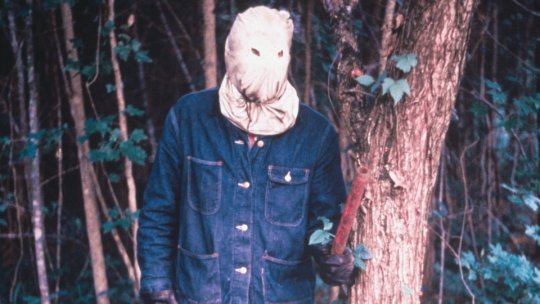

Texarkana is a sleepy town that is split between both Texas and Arkansas. Over the spring of 1946, a ruthless serial killer held the citizens of Texarkana in a state of perpetual fear. Even to this day, even the thought of the “Texarkana Moonlight Murders” sends a chill down the spine of the residents. This elusive killer predominantly targeted young couples parked on lovers’ lanes; their final attack, however, was committed against a middle-aged couple in their own farmhouse. Despite an abundance of theories and suspects, the identity of the “Phantom Killer” still remains unknown.
It all began on the night of February 22, 1946, when Jimmy Hollis, 24, and his girlfriend, Mary Jeanne Larey, 19, were parked in a secluded corner on a lonely road just off Richmond Road in Texarkana. The young couple had spent the evening at the cinema and decided they would stop down the lovers’ lane for some alone time before Jimmy dropped Mary back home. Out of the darkness, a man wearing a white cloth mask – presumably a pillowcase with eye holes – appeared at the car window and shone a flashlight into their eyes.
𝐑𝐞𝐚𝐝 𝐌𝐨𝐫𝐞:
100 notes
·
View notes
Text
Sneak peak teehee
Pls ignore any spelling mistakes im in the middle of exams rn
“Mom, I want to be a scientist.”
Miriam stopped what she was doing, knife halfway through a pumpkin. Her mouth hung open, just barely, then closed. Miriam's jaw was tense, the silence of the kitchen deafening. The only sounds were from the quiet tick of a clock in the dining room, and the hum of the fan above the dining room table. Miriam's daughter, Caroline Marie Callhourn, wanting to be a…scientist. Absurd, unladylike, a man's job. Miriam eventually went back to cutting the pumpkin, her demeanour a little more hostile than before.
”That’s a man’s job honey. You shouldn’t be thinking such nonsense.” Miriam spoke through gritted teeth. “You're still a child, you don’t know what’s best for yourself.”
Caroline sighed, turning to look down at her history homework. She took her glasses off, the thick black frames not doing her face any favours. Miriam was stern, set on what she thought was right. Modesty, marriage, children. Education wasn't important for a girl, let alone something like science. That was best left to the men, like fighting in war. Miriam raised Caroline to be the image of a future housewife: Neat hair that was always styled, her head adorned with curls from when she was 5 years old, dresses and skirts that went below her knee and hid her figure, a pair of simple silver studs for earrings. Caroline knew how to cook, and sew, and be in the presence of large crowds of adults. She knew how to smile well, how to stand, and how to sit to be ladylike enough. She knew bible verses, knew only what a woman in 1946 should be worried about knowing.
She also knew the senior school material that was taught in the physics and chemistry classes.
”I’m 16, I know what I want. You’re just trying to make me bored and stuck at home. Like you.”
Miriam stopped again, turning to her daughter. The tiredness was showing in her face and body language. She was tired of her daughter thinking she knew a thing about what she wanted.
”You do NOT speak to me like that! I am your mother and you will treat me how daughters are supposed to treat their mothers! Ungrateful, stupid girl-“ Miriam spat, the knife now pointed directly at Caroline. Her hair, normally done so neatly in a bun, was slightly loose.
Caroline didn't flinch. She was used to this, used to her mom thinking the worst of her. She simply went back to doing her homework, not paying attention to the woman who was still glaring daggers into her from the kitchen. Once again, it was silent, with the exception of the clock that was a tad too loud and the fan that sounded like it was going to fall. Miriam just sighed, letting out a small curse under her breath, then went back to preparing the pumpkin for dinner.
”You ought to get a hold of yourself. If your father were here, he would have smacked you stupid.”
#caroline portal#caroline portal 2#exams r hard :(#so is writing a character that has basically no canon story like everyone else in the game
7 notes
·
View notes
Text

Since I'm currently fixated on it, I'll point out a weird chronology thing in the movie EIGHT CRAZY NIGHTS... Yes, that 2002 animated Adam Sandler gross-out holiday movie... Because it's just what I do, I have this obsession with when things take place in movies.
In the movie, the character Whitey Duvall is turning 70 years old. And it's set around Christmas and Hanukkah, so... This implies that Whitey will either turn 70 at the very end of the year, or some time in the next year. Spring at the latest...
So, in a flashback scene much later in the movie, we see that Whitey's high school prom took place in 1946.
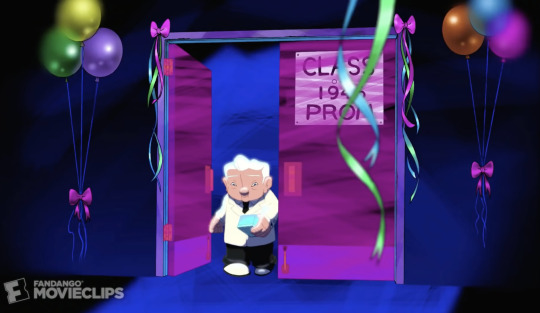
Typically, a high school senior in America is 17 by the time of prom, let alone graduation. I was 17 when I graduated, and would turn 18 later that fall. I was one of those "started school late" kids. I was probably a year ahead, but no matter.
So, prom of 1946 implies that Whitey was born in 1929. He turns 70 in the year 1999. 1999 was the year the Adam Sandler album STAN AND JUDY'S KID came out - September to be exact, which introduced the Whitey character.
EIGHT CRAZY NIGHTS was released in November 2002, and it's common for animated movies - given the long time it takes to make one - to be set a little before release or be a bit behind. Sometimes they can be a little outdated with their pop cultural references and imagery because of that, for example THE JUNGLE BOOK vultures being portrayed as the 1964-era Beatles when the movie was released at the end of 1967.
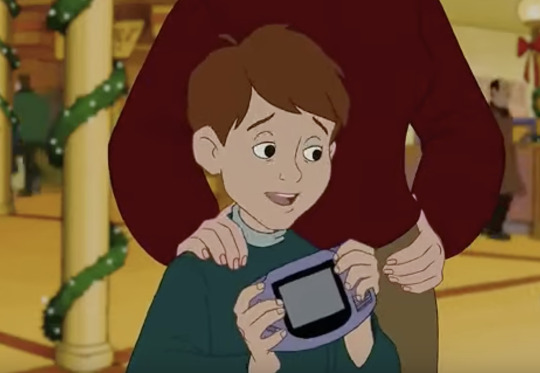
At one point in the movie, the character Benjamin is showing Whitey and Davey a Game Boy Advance. The Game Boy Advance debuted in North America in June 2001. Davey refers to it as just a "Game Boy" when insulting Whitey after he mistakes it for an Etch-a-Sketch.
It's very possible that the animators, during production, drew it as a Game Boy Advance because it was out and new at the time. The script probably refers to it as just a Game Boy or even just a handheld console.
Now, this detail sticks out to me because then the movie would be set in 2001... Whitey would have to have been born around really really late 1931 or early 1932, then... He'd be 14 in 1946, no way he'd have his senior prom! It's clearly set in 1999, but Benjamin has something that wasn't released in the real world until 2001!
I know, I know... I am looking WAY too much into this. I'm autistic, whaddaya expect? Lol.
Animated movies sometimes invent their own chronologies. Stories in general kinda do that. You know how many period pieces have vehicles in them that were manufactured after the year they're ostensibly set? Yeah, it's just one of those things...
And **I** notice them!
(You could imagine how much the "8 Years Later" title card in SPIDER-MAN: HOMECOMING really, reaaaaally threw me off, lol)
#eight crazy nights#8 crazy nights#adam sandler#hyperfixation#im hyperfixating again#autistic things#autistic#looking way too much into it#merry christmas#happy hannukah
40 notes
·
View notes
Text
Movie Musical Divas Tournament: Round 1


Ruby Dee (1922-2014): That Man of Mine (1946) as Joan | St. Louis Blues (1958) as Elizabeth
"Did you like Kara Young's performance in the revival of Purlie Victorious? Well guess who originated the role of Lutiebelle Gussie Mae Jenkins?! That's right! Ruby Dee! She was also married to Ossie Davis, who wrote the play and was the original Purlie. The film adaptation (Gone Are The Days!) is on YouTube, starring most of the original cast. While she does not have many musical credits to her name, she is nonetheless iconic." - anonymous
Dolores Gray (1924-2002): It's Always Fair Weather (1955) - Madeline Bradville | Kismet (1955) - Lalume | The Opposite Sex (1956) - Sylvia Fowler | Designing Woman (1957) - Lori Shannon
"a seasoned theater actress and tony winner whose voice was once described by a critic as “a freight-train slathered in honey," dolores gray would deserve movie musical legend status for the looney tunes brilliance of her "thanks a lot but no thanks" number from it's always fair weather alone, but thankfully she graced us with plenty of other fabulous musical numbers as well and has all the swag and style you could want in a diva." - anonymous
This is Round 1 of the Movie Musical Divas tournament. Additional polls in this round may be found by searching #mmround1, or by clicking the link below. Add your propaganda and support by reblogging this post.
ADDITIONAL PROPAGANDA AND MEDIA UNDER CUT: ALL POLLS HERE
Ruby Dee:



youtube
Photos and video submitted by: anonymous
Dolores Gray:



youtube
Photos and video submitted by: anonymous
16 notes
·
View notes
Text
Demonic dragons?
While researching examples of dragons who transform into humans I found this post by a history professor which mentions that in witch trials, dragons were identified as demons, referring to a trail from 1536 with someone ‘confessing’ that she was visited by a dragon who turned into a handsome young man every Thursday to eat and sleep with her. Dillinger writes this reinterpretation of “all the innumerable spirits beings of folk belief” was an easy way to explain them away and integrate them into the witchcraft doctrine.
From a fairy tale perspective, I’m more interested in dragons as mythical beasts who might shapeshift. But it did make me notice for the first time that some dragons in Slavic fairy tales do behave oddly demonic, almost incubus-like:
“He learned that a dragon was haunting the king’s daughter, and he boasted that he alone could destroy this terrible beast. The king’s men heard his boasts and they pressed him: “Go laborer, heal the princess!” [Horns, col. Afanasev, 1866, trans. Guterman, 1946.]
“One day the champions went hunting, stayed away fro a whole week, and upon their return could hardly recognize their sister, she had grown so thin. ‘What has happened to you?’ they asked her. She told them that a dragon had flown to her every day and that she had grown thin because of him. (…) About half an hour later, the trees in the forest suddenly began to rustle and the roof of the hut shook: the dragon came, struck the damp earth, turned into a goodly youth, sat at table, and asked for food.” [The Footless Champion and the Handless Champion, col. Afanasev, 1866, trans. Guterman, 1946.]
“One day the tsar went to another kingdom, to another king. He came to that king, and that king too had a very handsome daughter, and a twelve-headed dragon took to flying to her and he withered her young life; she was completely worn out. (…) he sucked her young life dry, he wore her out altogether.” [Ilya Muromets and the Dragon, col. Afanasev, 1866, trans. Guterman, 1946.]
And then I stumbled on this one, which is just fully a dragon demon:
“Ivashka took Sila aside and whispered to him: "Hark, ye, Sila Tsarevich, when you go to rest, beware lest you speak a word to your bride or you will not remain alive, and your head will be stuck on the last stake. She will in every way try to make you embrace her, but attend to what I say." Then Sila Tsarevich enquired why he warned him thus, and Ivashka replied: "She is in league with an evil Spirit, who comes to her every night in the shape of a man, but flies through the air in the shape of a six-headed dragon;” [Sila Tsarevich and Ivashka with the White Smock, ed. Steele, 1916.]
This (extremely unnerving) fairy tale even ends with not just killing the dragon, but also killing and then immediately resurrecting the ‘troubled’ wife, to get the evil spirits out of her body.
Personally I prefer the “some dragons can apparently feed on life force” take that the earlier three seem to provide...
If anyone else knows examples of this, I'd love to see them!
#dragon#dragons#laura babbles#slavic folklore#okay I think that's enough to appease the dragons on the brain for now
129 notes
·
View notes
Text
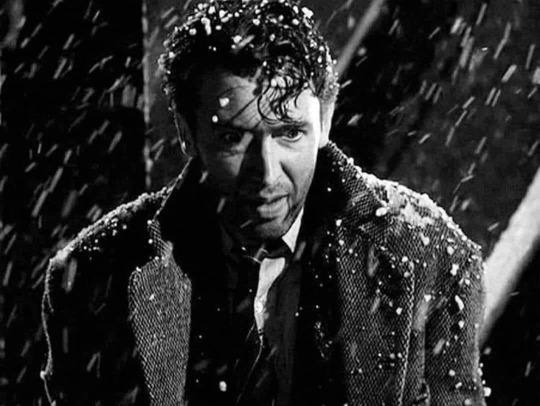
Enjoy “It’s a Wonderful life”? For all Jimmy Stewart fans...
Just months after winning his 1941 Academy Award for best actor in “The Philadelphia Story,” Jimmy Stewart, one of the best-known actors of the day, left Hollywood and joined the US Army. He was the first big-name movie star to enlist in World War II.
An accomplished private pilot, the 33-year-old Hollywood icon became a US Army Air Force aviator, earning his 2nd Lieutenant commission in early 1942. With his celebrity status and huge popularity with the American public, he was assigned to starring in recruiting films, attending rallies, and training younger pilots.
Stewart, however, wasn’t satisfied. He wanted to fly combat missions in Europe, not spend time in a stateside training command. By 1944, frustrated and feeling the war was passing him by, he asked his commanding officer to transfer him to a unit deploying to Europe. His request was reluctantly granted.
Stewart, now a Captain, was sent to England, where he spent the next 18 months flying B-24 Liberator bombers over Germany. Throughout his time overseas, the US Army Air Corps' top brass had tried to keep the popular movie star from flying over enemy territory. But Stewart would hear nothing of it.
Determined to lead by example, he bucked the system, assigning himself to every combat mission he could. By the end of the war he was one of the most respected and decorated pilots in his unit. But his wartime service came at a high personal price.
In the final months of WWII he was grounded for being “flak happy,” today called Post Traumatic Stress Disorder (PTSD).
When he returned to the US in August 1945, Stewart was a changed man. He had lost so much weight that he looked sickly. He rarely slept, and when he did he had nightmares of planes exploding and men falling through the air screaming (in one mission alone his unit had lost 13 planes and 130 men, most of whom he knew personally).
He was depressed, couldn’t focus, and refused to talk to anyone about his war experiences. His acting career was all but over.
As one of Stewart's biographers put it, "Every decision he made [during the war] was going to preserve life or cost lives. He took back to Hollywood all the stress that he had built up.”
In 1946 he got his break. He took the role of George Bailey, the suicidal father in “It’s a Wonderful Life.” The rest is history.
Actors and crew of the set realized that in many of the disturbing scenes of George Bailey unraveling in front of his family, Stewart wasn’t acting. His PTSD was being captured on film for potentially millions to see.
But despite Stewart's inner turmoil, making the movie was therapeutic for the combat veteran. He would go on to become one of the most accomplished and loved actors in American history.
When asked in 1941 why he wanted to leave his acting career to fly combat missions over Nazi Germany, he said, "This country's conscience is bigger than all the studios in Hollywood put together, and the time will come when we'll have to fight.”
This weekend, as many of us watch the classic Christmas film, “It’s A Wonderful Life,” it’s also a fitting time to remember the sacrifices of Jimmy Stewart and all the men who gave up so much to serve their country during wartime. We will always remember you!
Postscript:
While fighting in Europe, Stewart's Oscar statue was proudly displayed in his father’s Pennsylvania hardware store. Throughout his life, the beloved actor always said his father, a World War I veteran, was the person who had made the biggest impact on him.
Jimmy Stewart was awarded the Presidential Medal of Freedom in 1985 and died in 1997 at the age of 89.
H/T @mustangmarine
38 notes
·
View notes